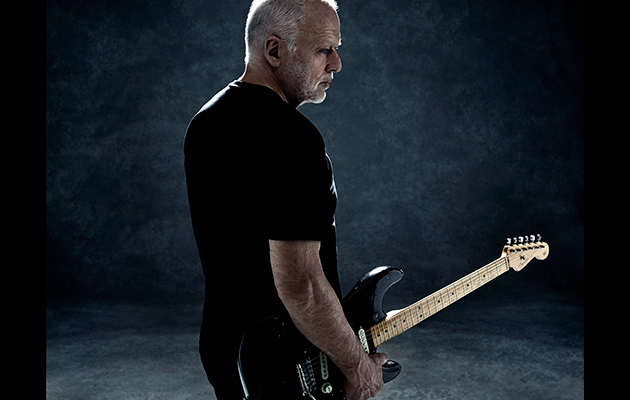Admittedly, it is hard to listen to Rattle That Lock and not make associations with Gilmour’s other albums. The title song, for instance, with the chorus line of “Rattle that lock and lose those chains” evokes a sense of liberation. Aubrey Powell speculates as to whether it represents “the essence of David’s creativity escaping from the entrapment of Pink Floyd, or whatever had been on his mind for the past few years.” But Gilmour quickly dismisses any suggestion that this – or any other song on the album – concerns his former band. “I wouldn’t connect any of the lyrics on this record to anything connected to Pink Floyd in any way,” he insists. “I’m not trying to make statements about Pink Floyd being finished or not being finished, or any other sagas that have gone on. Those lyrics are more to do shaking off the things that oppresses us in life. Politically, socially, whatever. Don’t put up with it, basically.”
All the same, another song – “A Boat Lies Waiting”, a hymnal piano piece featuring harmonies from David Crosby and Graham Nash – has a direct link back to Floyd. While The Endless River was Pink Floyd paying tribute to Rick Wright, this song feels more like Gilmour’s personal tribute. Gilmour even admits, “There’s a bit of Rick speaking I pinched. Rick loved sailing. I miss his ability and out common intuition, or telepathy, which is pretty obvious on The Endless River album. It’s a great shame Rick wasn’t around to help out on this one.” With its lyrical references to “a boat lies waiting / Still your clouds all flaming” and “what I lost was an ocean” it’s hard not to tie the song directly to the sleeve of The Endless River – which pictured a man rowing on clouds into a sunset. Gilmour seems surprised when I ask whether the reference is deliberate.
“No. How do you mean?”
The mentions of the boat, ocean, clouds; those are the things you see on the sleeve. “No. It’s not a connection, no,” he says. Gilmour concedes, though, that by using a sample of Wright’s voice, technically it means that his fallen comrade appears on the album.
Aubrey Powell sees other resonances in Rattle That Lock: if not with Floyd per se, but with earlier parts of Gilmour’s life. He cites the jazz-inflected “The Girl With The Yellow Dress”. “I said to David, ‘Does this remind you of when you were in Paris with [pre-Floyd band] Flowers, supporting Johnny Hallyday and Sylvie Vartan?’ He said, ‘Not really, but obviously my experiences of living and working in Paris are in my psyche somewhere.’ We’re making a little film for this, set in 1961, about the time David was there. So there are a lot of nuances coming through in this new album. It is riven with experience.”
There are further ties with Gilmour’s past among the album’s contributors. It features bassist Guy Pratt and guitarist Jon Carin, mainstays of the Gilmour-era Floyd; Rado Klose, Gilmour’s old school friend and, briefly, a member of Pink Floyd, plays guitar. All the musicians credited have, at one time or another, worked with either Floyd or accompanied Gilmour on his solo projects. But Gilmour’s key collaborator on Rattle That Lock is his wife of 21 years, the author Polly Samson. Their creative partnership began on The Division Bell and has continued ever since. “She’s an integral part of what I do,” confirms Gilmour. “I play her a few of the backing tracks with me singing over them – scatting words – and she chooses ones that appeal to her. She goes off and works on that for a while. In the past, she has tried to get inside my brain and think what I would be want to write about; but she’s releasing herself a little bit from that pressure now.”
Manzanera credits Samson with devising the album’s narrative – a ‘day in the life’ of Gilmour. “It says on the tin it’s a David Gilmour album, but it’s so much more than that. It’s what’s on their minds. They not only live together, but also work together creatively; the kinds of things they talk about are in the album. She should be credited as a producer, frankly.”
“I always want to write my own songs, my own lyrics and everything,” reflects Gilmour.” It just doesn’t happen very quickly. The idea that many people adhere to, the Nick Cave way – work, get in there, concentrate, focus – I’m told it would work for me, but I’ve never had that discipline. So far I find these things arrive as little moments. There’s a lot of slog to get there from there. I’m not enormously confident writing lyrics.”
There are two songs, however, for which Gilmour is credited as lyricist: “Dancing Right In Front Of Me” and “Faces Of Stone”.
“‘Dancing Right In Front Of Me’, that’s about the children, my children. My wishes for them,” he explains. “‘Faces Of Stone’ was about when my mother had the beginnings of dementia. We had a day together and we walked in the park. She died about nine months after my youngest daughter was born, so there was a period of time when they were both alive. It’s a reflection on beginnings and endings.”



